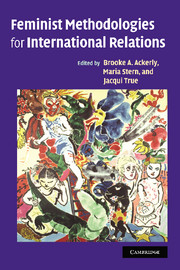Book contents
- Frontmatter
- Contents
- Notes on the contributors
- Acknowledgments
- 1 Feminist methodologies for International Relations
- Part I Methodological conversations between feminist and non-feminist IR
- Part II Methods for feminist International Relations
- 5 Motives and methods: using multi-sited ethnography to study US national security discourses
- 6 Methods for studying silences: gender analysis in institutions of hegemonic masculinity
- 7 Marginalized identity: new frontiers of research for IR?
- 8 From the trenches: dilemmas of feminist IR fieldwork
- 9 Racism, sexism, classism, and much more: reading security-identity in marginalized sites
- Part III Methodologies for feminist International Relations
- Conclusion
- Bibliography
- Index
5 - Motives and methods: using multi-sited ethnography to study US national security discourses
Published online by Cambridge University Press: 12 January 2010
- Frontmatter
- Contents
- Notes on the contributors
- Acknowledgments
- 1 Feminist methodologies for International Relations
- Part I Methodological conversations between feminist and non-feminist IR
- Part II Methods for feminist International Relations
- 5 Motives and methods: using multi-sited ethnography to study US national security discourses
- 6 Methods for studying silences: gender analysis in institutions of hegemonic masculinity
- 7 Marginalized identity: new frontiers of research for IR?
- 8 From the trenches: dilemmas of feminist IR fieldwork
- 9 Racism, sexism, classism, and much more: reading security-identity in marginalized sites
- Part III Methodologies for feminist International Relations
- Conclusion
- Bibliography
- Index
Summary
I needed an approach that didn't require bad guys with bad attitudes … an approach that would let you look at the nature of the way the whole thing was put together.
(Hacker 1990)Follow the metaphor
I embarked on my research on gender and security in the mid-1980s, during the height of the Cold War and the so-called “nuclear arms race” between the USA and the Soviet Union. The manufacture and stockpiling of tens of thousands of nuclear weapons, the quest for more “useable nukes” and more “survivable” weapons delivery systems – all of it seemed so wildly irrational to me that I was consumed by the questions: “How can they do this? How can they even think this way?”
Initially, those questions were more expressions of moral anguish and political despair than anything I might have ever thought of as “a good research question.” However, the intensity of my concern led me to take an opportunity to learn about nuclear weapons from some of the men who made their living thinking about nuclear weaponry and strategy. And that experience, my first close encounter with the discursive universe of national security elites, ultimately led me into an extensive, multi-sited study of the role of gender in shaping US national security paradigms, policies, and practices (Cohn, forthcoming). This chapter is a reflection on the methodological choices I made in the course of that study.
- Type
- Chapter
- Information
- Feminist Methodologies for International Relations , pp. 91 - 107Publisher: Cambridge University PressPrint publication year: 2006
- 29
- Cited by



